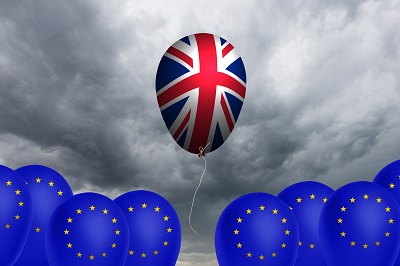Brexit Poison
By Pedro Schwartz

This is truly a letter from Europe, for I will try to explain why our Continent is in a right awful mess. A year ago, on June 23rd 2016, a majority of United Kingdom voters signified their wish to leave the European Union. These last three summers I have been teaching in England and in any case I know the place well: I can aver that there is no chance that such a decision will be reversed. Another electoral upset has added to the confusion. On June 8th the UK Prime Minister, Theresa May, held a snap general election and failed to increase her majority in the House of Commons as she hoped; now that the Conservatives are in a minority, she has a much weaker hand for her negotiations with the European Union.
On the other side of the Channel, the economy is still suffering from the 2008 financial crisis, with Greece still in deep trouble and growth generally lacklustre. Populist rumblings are heard on the Leninist left in Spain and on the extreme right in Italy, and what a disappointment it is to see the Magna Charta democracy sailing away from a Continent that has a great deal of dark history to bury.
Mrs. May’s troubles
Let me start with down-to-earth politics. As I say, Prime Minister May is in a minority and needs the votes of the ten members of the Democratic Unionist Party of Northern Ireland to be able to effectively govern. Though the DUP is staunchly ‘Leave’ on the question of Brexit, the Northern Irish are greatly worried about an international border separating them again from the Republic in the South. Can the present seamless communication between the two parts of the Isle that does so much for peace and prosperity be preserved? A further complication is that the DUP is staunchly conservative in matters of abortion and same-sex marriage, which crosses the open-mindedness of British Conservatives, whose leader in Scotland, Ruth Davidson, is soon to marry her female partner.
Theresa May’s minority government now has to consider contending views in Parliament and in the country. It is not only in Ireland that large numbers worry about leaving the European Union. In Scotland, too, there were more votes in favour of staying in the European Union than of leaving. The main reason is that EU agricultural and public work subsidies greatly benefitted the poorer regions of Europe. Socialists in the Labour Party would not hear of doing away with ‘workers rights’ embedded in European legislation. One must not forget the 48.1% who voted to stay in Europe.
One must also take into account the personality of the Prime Minister. She is not a second Margaret Thatcher: not a pro-market, free trade liberal, but a paternalist Tory who wants to re-industrialise the country and listen to the voice of the ‘ordinary people’ ignored by the pro-European elite. She instinctively sympathises with the people who want a better National Health Service, better funded state schools, a more equalising taxation, and more regulation.
These cross-currents will muddy the negotiations, themselves very complicated because of the depths to which European legislation has penetrated the United Kingdom in all its aspects. The time left for negotiation is until March, 2019 and then all the Parliaments of the EU nations will have to approve the terms unanimously. Along the way, the UK Parliament will have to pass eight monster bills to expunge European legislation from the Law books.
Complaints
For more on these topics, see the EconTalk podcast episode Crafts, Garicano, and Zingales on the Economic Future of Europe. See also “Brexit!”, by Pedro Schartz, Library of Economics and Liberty, September 5, 2016; and “A Populist Referendum and the Price of Being Single”, by Anthony de Jasay, Library of Economics and Liberty, August 1, 2016.
The four reasons why a majority of the British people voted to leave were: to regain control of their laws, their borders, their moneys, and their independence. Even among the ‘remainers,’ many resent the fact that within Europe the UK Parliament is not sovereign; and they do not accept that the European Court of Justice can reverse the decisions of British Courts. They are proud of their ‘Mother of Parliaments’ and of the quality of their judges.
A second point of difference with the European Union is the free movement of people in and out of the country. The United Kingdom is a multi-racial community, but many are scared of a Muslim invasion, especially after repeated terrorist crimes. There are also complaints of abuses of the welfare state by immigrants, as there are of the competition of workers coming from Eastern Europe.
The third source of discomfort is the large UK contribution to the EU budget. There was much exaggeration during the referendum campaign, with some leavers saying it was equivalent to the cost of a week’s hospital stay. The net amount must be calculated as follows: In 216 the UK government paid £13.1 billion toward the EU budget, and EU spending on the United Kingdom was forecast to be £4.5 billion. So the United Kingdom’s net contribution was estimated at about £8.6 billion. Without the rebate Mrs. Thatcher forced through at the Lisbon Summit, the sum would have £17 billion. Still, £11 billion a year is a tidy sum.
And the fourth point of contention is the old resistance to the programmatic assertion in the European Treaties since 1983, that “on the basis of an awareness of a common destiny [the signatories wish…] to affirm the European identity, [and] confirm their commitment to progress towards an ever closer union among the peoples and Member States of the European Community.” This has proved to be unacceptable even to pro-European Brits.
“Brexit is Brexit”
When Mrs. May spoke for the first time on the steps of Ten Downing Street after becoming Prime Minister she uttered the self-satisfying phrase that “Brexit is Brexit”. There is nothing more fulfilling than tautologies: they are always true. One can only try to fill them with meaning by surmising intentions. In this case she was not saying much. There are at least three possible meanings: hard Brexit, soft Brexit, and negotiated Brexit.
Hard Brexit means the United Kingdom walking away, managing their affairs according to their will, being content with World Trade Organisation rules, and making the London City fare on its own, no favours asked. This would pose some hard questions, such as the rights of EU residents in Europe and vice versa. There are no less than three million EU residents in the United Kingdom today and 1.2 million British living in Europe. Spain has the largest contingent: 308 thousand, one third of which are pensioners who for the time being can unrestrictedly use our health service and receive their pensions paying Spanish taxes. On the other hand, the United Kingdom needs those immigrants, especially doctors and nurses. In any case the human cost of expulsion by either side would be unbearable. As for trade, the cost of leaving the Single European Market would not be as grave as Brussels says and the tamer part of British business claims. After all, the average external tariff of the European Union is low, estimated by the World Bank to be 1.6%. True, there would be more red tape. And as to services, I do not see Frankfurt or Paris displacing London as a financial or insurance centre. If Europe can sign a trade treaty with Canada, why should it not be able to do so with the United Kingdom? If the British government were composed of libertarians it could throw away the principle of reciprocity in trade and just open up the economy to foreign imports of goods and services—to the benefit of British consumers and as a wake-up call for British producers—along the lines of Hong Kong or Singapore. A further advantage of just walking away would be not having to pay the 60 billion euro ($64.73 billion) that Brussels is asking as a leaving fee. However, I do not see Mrs. May taking the libertarian road.
A Soft Brexit solution would be joining the small European Free Trade Area (EFTA) made up of Norway, Switzerland, Iceland, and Lichtenstein. These countries have access to the Single Market but must allow free movement of people and submit to the rulings of the EFTA Court. Also, they would have to obey EU laws in whose drafting it had no say, just as is the case of Norway regarding the EU. This is, in sum, no ‘soft’ Brexit.
All that is left then is Negotiated Brexit. We do not know nor can we know the final content of the deal. Mrs. May has just made a generous offer for EU nationals settled in the UK. Those that have been legally there for five years can stay indefinitely with all the advantages of British nationals. Those who arrived before the break away date or have less than five years to their credit will be able to build up ‘settled status’ so that they can reach the five years. After that, all will depend on the Immigration Bill and the European reciprocal concessions. But one thing she made clear: it will be for the British Courts to adjudicate.
Will the opportunity be missed?
“From my point of view, the great opportunity to build a free trading and fully capitalist United Kingdom should not be missed. Here is the chance to show what the British can do.”
From my point of view, the great opportunity to build a free trading and fully capitalist United Kingdom should not be missed. Here is the chance to show what the British can do. However, I read that opinion polls reveal a veering of public opinion to the left: 36% versus 32% now believe socialism is superior to capitalism. All the talk in the papers and on the radio is that more money should be spent on the failing National Health Service and the less than satisfactory state schools; and workers’ rights guaranteed under European Union rules should be expanded when the United Kingdom breaks away, including the minimum wage, which some clever double-think minister has dubbed ‘the living wage’. As you can see, I am not optimistic. The only silver lining in the grey clouds is that I will still be able to teach at Buckingham, for the grace period at least.
*Pedro Schwartz is “Rafael del Pino” Research Professor of economics at Universidad Camilo José in Madrid. A member of the Royal Academy of Moral and Political Sciences in Madrid, he is a frequent contributor to the European media on the current financial and social scene. He currently serves as President of the Mont Pelerin Society.
For more articles by Pedro Schwartz, see the Archive.

